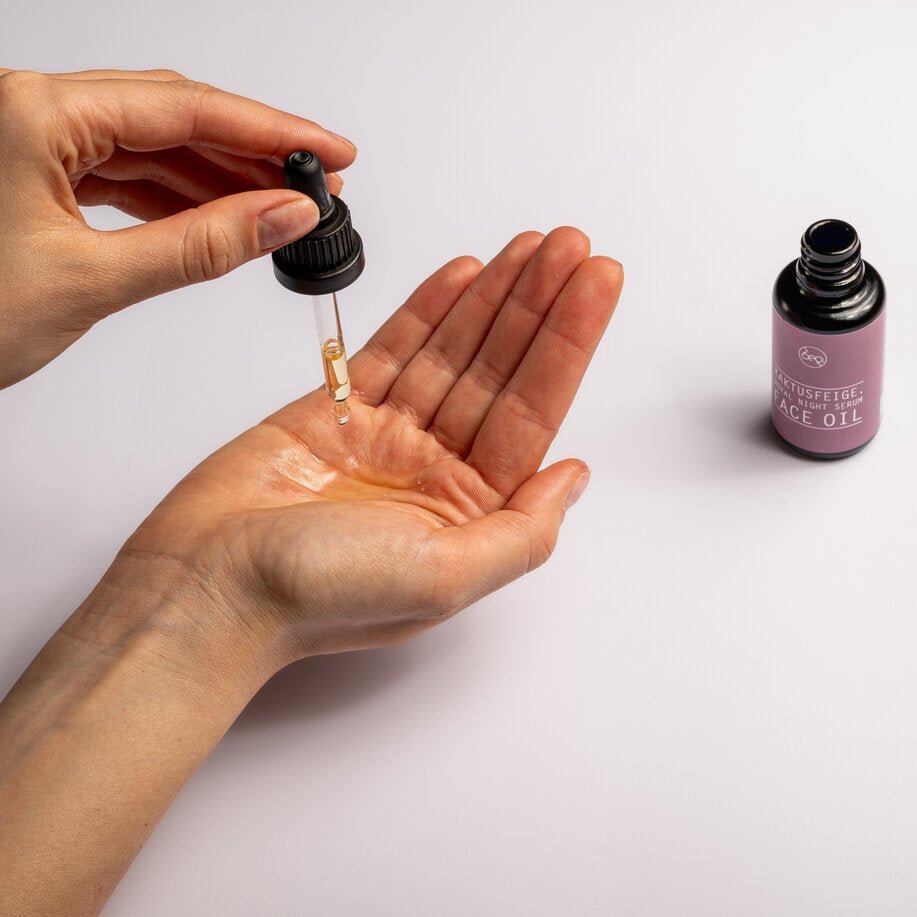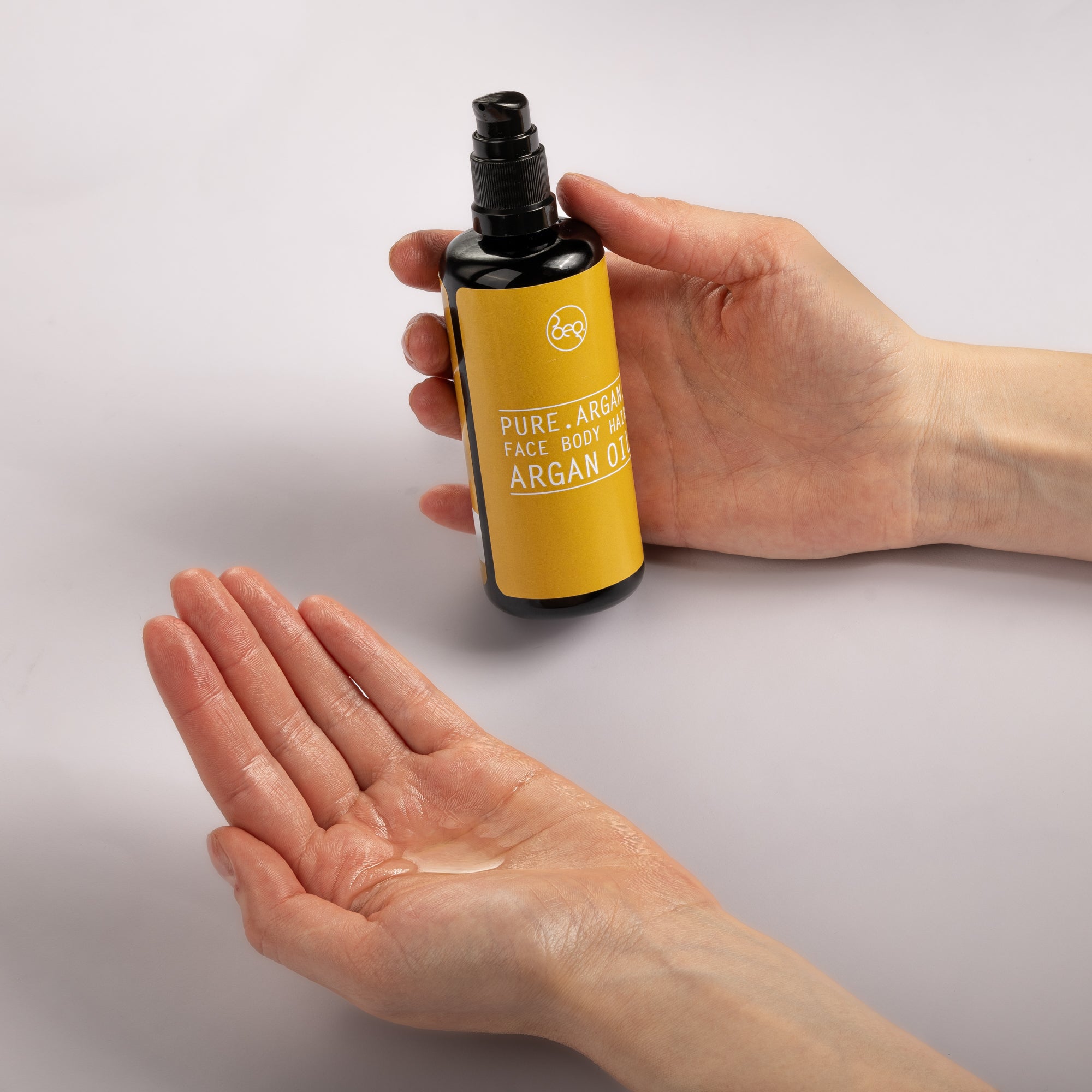
Can oil really moisturize the skin?
We love virgin plant oils because their many beneficial components make them wonderfully nourishing for the skin. Furthermore, thanks to the skin's natural lipid content, they can selectively transport active ingredients into the deeper layers of the skin, where they unfold their effects.
But do plant oils alone actually provide moisture?
Some myths can be found on the Internet or brands advertise their oils as moisturizing: “xxx oil moisturizes.” “xxx oil helps moisturize the skin.”
Scientifically speaking, this isn't true, because pure vegetable oils don't contain any water. They're actually hydrophobic, meaning they're barely soluble or even insoluble in water. They're essentially water-phobic.
The fact is: Vegetable oils alone do not moisturize the skin, but they help to retain existing moisture in the skin and protect the skin from additional water loss.
A brief digression: Our skin is covered by a hydrolipid film composed of sebum, lipids (ceramides, cholesterol, fats), amino acids, and dead skin cells. This layer protects our skin from moisture loss, germs, and environmental pollutants.
Sounds like you can care for your skin exclusively with plant-based oils. Is that always true?
Basically, as long as your skin benefits enough from oil care alone, there is no reason to change anything.
- For balanced skin, because it is able to produce sufficient natural emulsifiers.
- Over-cared or irritated skin (e.g. due to aggressive surfactants, synthetic emulsifiers, an excess of products) benefits from oils in combination with pure hydrolates such as Balancing Tonic
- Usually young skin.
By always applying oils to slightly damp skin, you essentially support the oil's ability to spread across the surface, preventing over-application and protecting the skin from being overloaded.
The oil combines with the water and can thus optimally lock the moisture into the skin and store it for a long time, ensuring that the skin is intensively moisturized.
It also feels incredibly soft to apply oils this way.
bepure Tip: Avoid applying oil to dripping wet skin, as this will most likely dilute the product before all the good nutrients can penetrate.
Oils are part of the moisturizing process and water acts as a carrier so that the oil can be absorbed well into the skin.
Our skin needs moisture and fat at the same time so that the skin does not lose moisture.
Mature or dehydrated skin benefits from using a product with moisture-binding ingredients alongside the oil care.
Combine Soothing Nectar (contains moisture-binding ingredients such as hydrolates, hyaluronic acid or glycerin, extracts) before applying Intensive Daycare , Miracle Beauty orRoyal Night Serum , for example.

Did you know that as we age (depending on your skin type, even after age 25), our skin gradually loses its ability to produce sebum (our own natural oil)? This is when fine lines and wrinkles begin to appear.
Vegetable oils consist mainly of lipids, which are optimally absorbed by the skin due to their similarity to the skin's own lipids.
Plant oils can improve the function of the lipid barrier, which protects the skin from drying out and thus prevents the formation of wrinkles. Plant oils can also stimulate cell growth and improve skin elasticity.
To prevent your skin from losing too much moisture, a good plant-based oil should be a regular part of your skincare routine.
1. Oil prevents excessive water loss from the skin.
2. Oil replenishes and strengthens the skin barrier.
3. Oil supplies the skin with ceramides (an important component of our skin barrier).
When distinguishing suitable oils for the body or face, the focus should be on the skin type.
An important factor is the specific fatty acid spectrum of the respective vegetable oil. This determines, among other things, whether an oil is quickly absorbed, provides a soft skin feel, or forms a film. There are various fatty acids, for example,
- Omega-9 (oleic acid, monounsaturated)
- Omega-6 (e.g. linoleic acid, 2-fold unsaturated)
- Omega-3 (α-linolenic acid, 3-fold unsaturated)
- Palmitic acid and stearic acid (saturated fatty acids)
Argan oil has a balanced ratio of oleic, palmitic, and linoleic acids and is ideal for dry, mature, or problematic skin. It increases skin elasticity and supports the regeneration of the skin barrier. You'll find it in all our oil-based products.
Prickly pear seed oil has an exceptionally high content of linoleic acid, which promotes skin barrier protection and is very important for an intact skin barrier.
Cranberry seed oil (omega-3) and evening primrose oil (γ-linolenic acid) promote the skin's own regeneration processes and protect against oxidative damage. Suitable for dry, blemished, and oily skin. You'll find all of these oils combined in ourRoyal Night Serum .

Conclusion: Plant oils are wonderful skin nourishment, but they do not provide moisture on their own.










Leave a comment
This site is protected by hCaptcha and the hCaptcha Privacy Policy and Terms of Service apply.